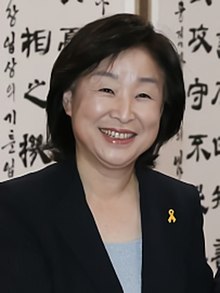- ↑ "Korea's electoral map is being totally rewritten". Korea JoongAng Daily . 28 July 2015. Archived from the original on 9 October 2017. Retrieved 5 October 2015.
- 1 2 "심상정 정계 은퇴 선언 "통절한 마음으로 사죄드린다"". 11 April 2024. Archived from the original on 14 April 2024. Retrieved 14 April 2024.
- ↑ "Former Justice Party chief Sim Sang-jeung retires from politics". koreajoongangdaily.joins.com. 11 April 2024. Retrieved 16 April 2024.
- 1 2 "Pot Holder Episode 4 Engsub | Kshow123". Kshow123. Archived from the original on 18 December 2017. Retrieved 29 June 2017.
- ↑ Won, Jeesoo (15 April 2017). "Impact Player: Sim Sang-jung". Centre for Strategic & International Studies. Archived from the original on 24 December 2020. Retrieved 11 March 2022.
- 1 2 3 심상정 : 네이버 통합검색. search.naver.com (in Korean). Archived from the original on 31 January 2019. Retrieved 28 April 2017.
- ↑ Political handbook of the world, 2018-2019. Thousand Oaks, California: Sage, CQ Press. 2019. p. 871. ISBN 978-1-5443-6327-1.
- ↑ "진보정당 첫 4선 심상정, 씁쓸한 '나홀로 당선' - 머니투데이". news.mt.co.kr (in Korean). 16 April 2020. Archived from the original on 17 December 2021. Retrieved 20 September 2020.
- 1 2 "'Sexism exists': S.Korea feminist presidential candidate's lonely crusade". France 24. AFP. 8 March 2022. Archived from the original on 8 March 2022. Retrieved 10 March 2022.
- 1 2 "'Sexism exists': South Korean feminist presidential candidate's lonely crusade". The Japan Times . AFP. 8 March 2022. Archived from the original on 10 March 2022. Retrieved 10 March 2022.
- ↑ "[JTBC 대선토론] 문재인 "동성애 합법화 반대"…심상정 "유감스럽다"". Naver . The Korea Economic Daily. Archived from the original on 8 December 2019. Retrieved 7 May 2017.
- ↑ "유승민 "보수 대표 후보 가려달라"…심상정 "사드 배치 철회"". Naver . TV Chosun. Archived from the original on 8 December 2019. Retrieved 7 May 2017.
External links
- Official website (in Korean)
- Sim Sang-jung on Twitter
Sim Sang-jung | |
|---|---|
심상정 | |
 Sim Sang-jung in 2015 | |
| Member of the National Assembly | |
| In office 30 May 2012 –29 May 2024 |
| Leaders (Interim) | |
|---|---|
| Presidential candidates (Presidents) | |
| Floor leaders | |
| Preceding parties |
|
| Related articles | |